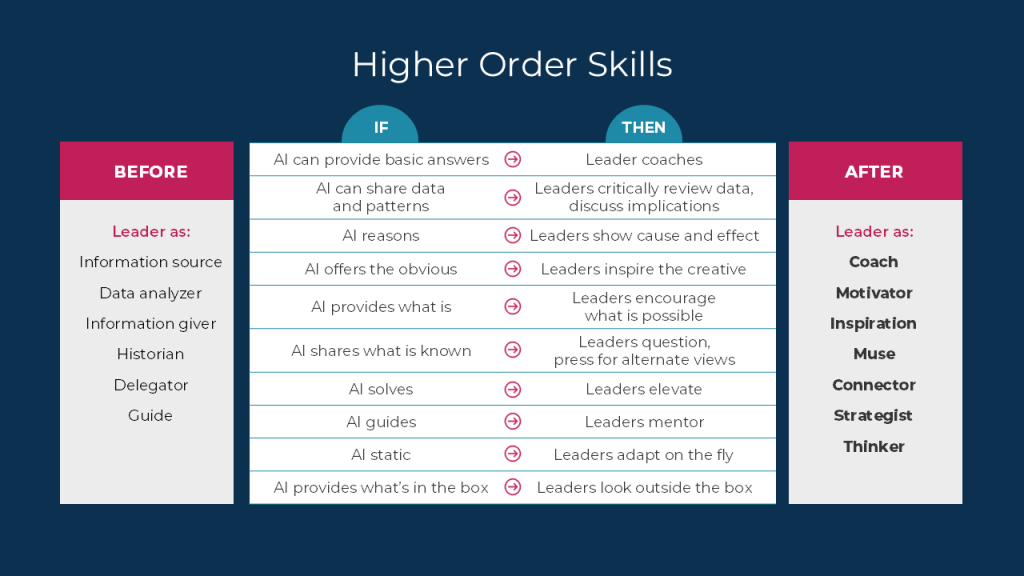
With all the buzz around generative artificial intelligence (AI) tools, we’re on the brink of some transformative change thanks to technology. But here’s the thing: While tech is evolving at lightning speed, so are people’s feelings and thoughts.
Employees are experiencing a mix of excitement and caution about how AI might change their work lives, and they’re looking to their leaders to guide the way. In fact, according to research we conducted, a solid 76 percent of employees believe that leadership is key to successfully rolling out AI in their workplaces.
However, a bit of a gap exists: Only 48 percent think their leaders are ready for the challenge. If companies want to fully embrace AI, it will take more than just enthusiasm. Leaders need to integrate tech smoothly, spark confidence, and build trust—but how?
The Changing Role of Leaders
Historically, leaders have functioned as information gatekeepers, organizational historians, strategic guides, and analytical experts. But what does it mean for the future of leadership if AI assumes many of these functions? Will leaders become obsolete? The answer is a resounding “No!”—leaders are still essential, but where their focus needs to be is shifting.
While AI excels at processing limitless quantities of data and identifying patterns that might elude human perception, it cannot replicate the nuanced judgment and emotional intelligence that define exceptional human leadership.
As AI handles the computational heavy lifting, leaders are free to engage more deeply in coaching or mentoring and cultivating environments where innovation thrives. Rather than simply presenting predetermined solutions, today’s leaders can catalyze creative thinking and guide teams toward unexplored possibilities. So far, AI has not been able to foster teamwork, understand interpersonal differences, or unleash the potential of human connections the same way a human leader can. If AI can manage more mundane tasks, leaders can focus on leading more effectively.
By integrating AI into their workflows, leaders can become coaches, motivators, sources of inspiration, connectors, strategists, and thoughtful decision-makers. This shift allows leaders to harness the strengths of AI while emphasizing the irreplaceable human qualities that drive successful teams.

Leading in the Age of AI: The Capabilities that Set Great Leaders Apart
Leaders can inspire the confidence needed to successfully lead human+AI initiatives by harnessing a blend of capabilities: intellectual acumen, technological fluency, emotional intelligence, and cultural awareness.
Intellectual Acumen
Even though AI tools can whip up answers in no time, leaders still need their knowledge and experience to make those results meaningful. With AI handling data analysis at lightning speed, leaders can shift their focus to validating and interpreting that information with a critical eye. It’s all about turning data into insights and making smart decisions.
When leaders know how to dig into AI outputs, they can assess various scenarios and innovate like never before. AI gives leaders the data; it’s their job to act, provide the wisdom that turns numbers into something meaningful, and use that to influence others.
Technical Fluency
With just 33 percent of our respondents expressing confidence that leaders have enough tech expertise to successfully lead an AI initiative, there is work to do. But with the pace of technological change, it’s hard to know what “good” looks like with respect to tech education or to declare victory in achieving it.
While leaders don’t need to be coding experts, being tech-savvy is a must, and tech-savvy leaders aren’t afraid to adopt AI tools. Leaders should integrate new tools into their daily work and prompt their teams to do the same. Leaders also should ensure that their teams feel comfortable exploring these technologies by encouraging innovation and providing resources that support exploration. However, only 51 percent of individual contributors say their leaders encourage AI innovation, and only 40 percent say their leaders provide the resources to do so.
Waiting around to see how AI pans out is a risky move that could leave leaders trailing behind. Instead, leaders need to embrace technology and become champions of digital transformation.
Emotional Intelligence
Emotional intelligence becomes elevated against the backdrop of AI because this new tech allows leaders to spend more of their energy on human connection. Emotional intelligence refers to being self-aware and understanding your own feelings and the feelings of others, which are essential for building genuine connections and for relating to people on a deeper level.
Emotionally intelligent leaders in the age of AI:
- Recognize that while tech advances can be thrilling, they also can cause anxiety.
- Make room for team members to share their thoughts and feelings about AI, fostering an environment where open discussions can thrive.
- Stay calm during data-driven decision-making
- Are open to dialogue about any concerns their team might have.
- Listen to and value the input and contributions of their team, especially in times of change.
- Share what they know when they know it, increasing transparency and building trust.
More than half of individual contributors and a similar percentage of leaders who participated in our research feel that communication about AI is transparent. However, a significant portion either disagrees or remains neutral, indicating that not everyone feels fully informed or engaged in discussions about AI.
While many companies are still figuring out how to integrate AI, most are approaching the integration process with a focus on risk mitigation and control rather than a “let’s explore the possibilities” mindset. Shifting this mindset and broadening conversations about AI can help illuminate the path forward. While it’s valuable for senior leaders to consider AI’s role and impact thoughtfully, these conversations must reach all levels. Otherwise, employees may feel left in the dark.
Cultural Awareness
Cultural awareness means recognizing how a diverse workforce affects work dynamics and communication. Leaders with strong cultural awareness know how to encourage conversations about AI while creating a space where everyone feels comfortable sharing their thoughts, whether they are excited or uncertain.
As organizations take their first steps into large-scale AI adoption, the characteristics of a truly supportive environment are still evolving. This uncertainty is evident in the perspectives of both individual contributors and leaders—only about 25 percent feel their culture fosters AI adoption, while another quarter believes it does not. Meanwhile, a significant portion—45 percent of individual contributors and 51 percent of leaders—remain uncertain.
Culturally aware leaders are better equipped to relate to their teams and navigate different perspectives, enabling more effective collaboration. They understand that differences can strengthen teams, making promoting a healthy adoption of technology easier.
The key opportunity here lies in how leaders can proactively shape a culture that not only encourages AI adoption but also ensures its responsible and equitable use. At its core, a supportive AI culture is human-centered. Amid the excitement around AI, it’s crucial to recognize that building a strong AI culture goes beyond technology and tools. Leaders must connect AI efforts to the organization’s overarching mission and define clear goals for its use.
Human-Centric Leadership for the Future of AI
Strong leadership in an AI-driven future requires a blend of intellectual depth, cognitive agility, and digital savvy. As technology reshapes the workplace, the human side of change becomes even more critical. Leaders now have a unique opportunity to strengthen their higher-order thinking and human connection skills—essential qualities for guiding their teams with insight and empathy. Those who master this balance won’t just empower their people; they’ll foster a powerful synergy between humans and AI, driving success in the era ahead.



